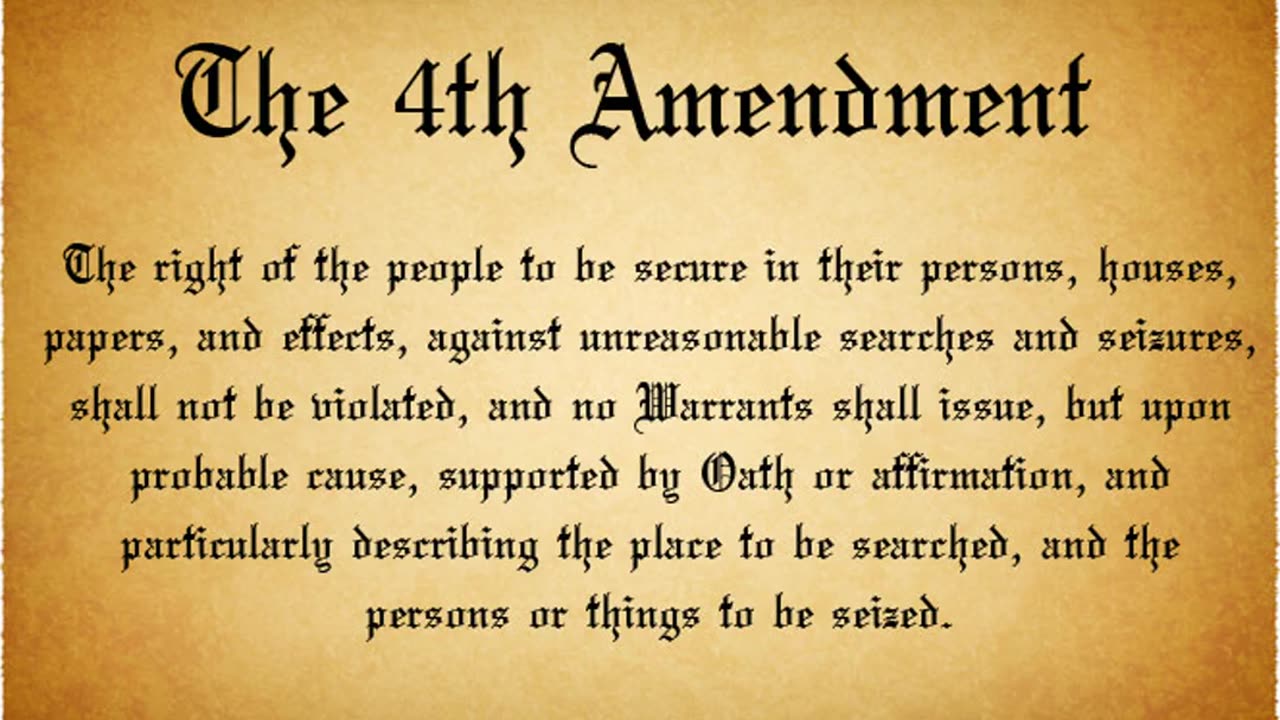Premium Only Content

The Fourth Amendment to the United States Constitution
The Fourth Amendment to the United States Constitution is a crucial part of the Bill of Rights, protecting citizens from unreasonable searches and seizures by the government. Here are the key points:
Protection Against Unreasonable Searches and Seizures: The Fourth Amendment ensures that individuals have the right to be secure in their persons, houses, papers, and effects. This means that law enforcement cannot conduct searches or seize property without a valid reason1.
Warrant Requirement: For a search or seizure to be considered reasonable, it generally must be conducted with a warrant. This warrant must be issued by a judge or magistrate and based on probable cause. The warrant must also specify the place to be searched and the items or persons to be seized.
Probable Cause: Law enforcement must have a reasonable basis to believe that a crime has been committed and that evidence of the crime is present in the place to be searched.
Exclusionary Rule: Evidence obtained in violation of the Fourth Amendment is typically inadmissible in court. This is known as the exclusionary rule, which aims to deter unlawful searches and seizures by law enforcement.
The Fourth Amendment has been interpreted and applied in various ways over the years, especially with the advent of new technologies and changing societal norms.
The Fourth Amendment’s application to digital surveillance and privacy issues has evolved significantly, especially with the rise of new technologies. Here are some key points on how it applies:
Digital Surveillance and Privacy
Expectation of Privacy: The Fourth Amendment protects against unreasonable searches and seizures, which includes digital data. The Supreme Court has ruled that individuals have a reasonable expectation of privacy in their digital communications and data, even when held by third parties.
Warrant Requirement: Law enforcement generally needs a warrant to access digital data. This was reinforced by the Supreme Court’s decision in Carpenter v. United States (2018), which held that accessing historical cell phone location data requires a warrant1. This decision marked a significant shift in how the Fourth Amendment is applied to digital information.
Third-Party Doctrine: Traditionally, the third-party doctrine allowed law enforcement to access information shared with third parties (like phone companies) without a warrant. However, recent rulings have started to limit this doctrine, recognizing that digital data can be highly personal and sensitive.
Technological Advances: As technology advances, courts are continually reassessing how the Fourth Amendment applies. For example, the use of GPS tracking, automated license plate readers, and other surveillance technologies are scrutinized to ensure they do not violate privacy rights.
Balancing Act: Courts often balance the government’s interest in security and law enforcement with individuals’ privacy rights. This balance is crucial in determining the legality of digital surveillance practices.
Key Cases and Developments
Carpenter v. United States: This landmark case established that accessing cell phone location data without a warrant violates the Fourth Amendment.
Riley v. California: The Supreme Court ruled that police must obtain a warrant before searching a cell phone seized during an arrest.
These rulings highlight the ongoing efforts to adapt the Fourth Amendment to the digital age, ensuring that privacy rights are protected even as technology evolves.
-
 DVR
DVR
Chad Prather
15 hours agoStanding Firm When the World Says Sit Down
25.1K41 -
 LIVE
LIVE
LFA TV
11 hours agoLIVE & BREAKING NEWS! | THURSDAY 11/20/25
2,998 watching -
 LIVE
LIVE
AP4Liberty
11 hours agoTrump–Musk Alliance 2.0: What Their Sudden Reconciliation Means for America’s Future
373 watching -
 22:20
22:20
World2Briggs
18 hours ago $10.90 earnedEveryone Is Leaving These 15 States. Truth Behind the Trend.
22.1K14 -
 4:24
4:24
Gamazda
19 hours ago $4.84 earnedDeep Purple – Smoke On the Water (Live Piano Cover in a Church)
12.9K14 -
 12:54
12:54
Brad Owen Poker
13 hours ago $1.79 earnedI Make Final Table! I’m Going To $10,400 WPT World Championship!!
10.8K1 -
 10:00
10:00
TheMightyMcClures
22 days ago $1.31 earnedWe Fed 500 Families!
12.3K4 -
 6:23
6:23
The Shannon Joy Show
14 hours agoWas Covid a MILITARY OPERATION?
11.9K7 -
 LIVE
LIVE
The Bubba Army
23 hours agoTRUMP SIGNS EPSTEIN BILL! - Bubba the Love Sponge® Show | 11/20/25
1,506 watching -
 27:24
27:24
DeVory Darkins
22 hours agoTrump secures RECORD BREAKING INVESTMENT as Charlotte Schools issue SHOCKING Update
38.5K49